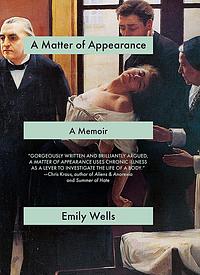Take a photo of a barcode or cover
Let's try again to tell the story: I am sick, possibly have always been sick, and now my sickness has a name. What should I do differently? For a newly diagnosed person with internet access, the suggested remedies are dizzying, endless, and offer little hope. Avoid caffeine. No alcohol or recreational drugs, ever. Expensive air purifiers I cannot afford might help with respiratory symptoms and rashes. I should use all organic, fragrance-free products in the home, and live in a home built before or after various years when toxin regulations had changed. I should live far from cell phone towers. On top of my medications to manage pain and suppress immune response, I should take between ten and twenty supplements each day and chart how my body responds to each. I should adjust my expectations for myself, for my life: read only that which is short and succinct, comprended through brain fog, spend nights in, surround myself only with those who understand the gravity of my illness, and take other, similar precautions. I should have access to resources, doctors, and services that would be possible only under fully automated luxury communism. Insurmountable. I have come to recognize the sense of fatalism this engenders as emblematic of the particular tone of the life spent sick. Suddenly, you can't smile or laugh or find joy or hope in anything. To a healthy person, it might look like depression.
Daudet wrote that "pain is always new to the sufferer, but loses its originality for those around him."
Western medical discourse has never relinquished the insistence that an illness that can be observed in a scan or measured by a test is real and one that cannot is likely unreal. In 2006, the New York Times ran and article titled "Is Hysteria Real? Brain Images Say Yes" -- the troubling implication of the headline being that neurological or psychological disorders without observable brain qualities can be safely assumed to be "unreal."
"Passion" comes from the Latin root word patior, which, historically, refers to the time between the Last Supper and Good Friday, when Christ knew that one of the apostles would hand him over to be killed. Suffering is knowing what happens next.
Derrida argued that the idea of democracy suffered from a fatal "autoimmunity," in that its requirements for freedom and equality canceled each other out.
The publisher's announcement of this book's future release describes it as "a memoir of revelation through chronic pain." But I don't think pain is revelatory, I complained to a friend upon reading this. I don't think my pain has taught me anything. When someone suggests that surely there are lessons or positives to be taken away from pain and suffering, it sounds as tone-deaf as the unsolicited suggestions of diets or healers--a vain, human effort to ascribe meaning when there is none....Nevertheless I want a painful clarity of illness. I want to prioritize concrete detail over abstraction, to reject that a story of endurance can be granted resolution.
Daudet wrote that "pain is always new to the sufferer, but loses its originality for those around him."
Western medical discourse has never relinquished the insistence that an illness that can be observed in a scan or measured by a test is real and one that cannot is likely unreal. In 2006, the New York Times ran and article titled "Is Hysteria Real? Brain Images Say Yes" -- the troubling implication of the headline being that neurological or psychological disorders without observable brain qualities can be safely assumed to be "unreal."
"Passion" comes from the Latin root word patior, which, historically, refers to the time between the Last Supper and Good Friday, when Christ knew that one of the apostles would hand him over to be killed. Suffering is knowing what happens next.
Derrida argued that the idea of democracy suffered from a fatal "autoimmunity," in that its requirements for freedom and equality canceled each other out.
The publisher's announcement of this book's future release describes it as "a memoir of revelation through chronic pain." But I don't think pain is revelatory, I complained to a friend upon reading this. I don't think my pain has taught me anything. When someone suggests that surely there are lessons or positives to be taken away from pain and suffering, it sounds as tone-deaf as the unsolicited suggestions of diets or healers--a vain, human effort to ascribe meaning when there is none....Nevertheless I want a painful clarity of illness. I want to prioritize concrete detail over abstraction, to reject that a story of endurance can be granted resolution.
4.5
I took a class freshman year of college about women and "madness" throughout history and had plenty of discussions regarding Charcot and his patients/practices he and other male neurologist/ doctors of the time would use. And while I liked this 'refresher' of topics I've learned about (I think Wells did it better than the author of our textbook Mad, Bad, and Sad), I find that I would've liked to read more fleshed-out experiences Wells had with her illness (I'm okay with not having answers; I just wanted more of what she was already giving us)
Great, great, great!
I took a class freshman year of college about women and "madness" throughout history and had plenty of discussions regarding Charcot and his patients/practices he and other male neurologist/ doctors of the time would use. And while I liked this 'refresher' of topics I've learned about (I think Wells did it better than the author of our textbook Mad, Bad, and Sad), I find that I would've liked to read more fleshed-out experiences Wells had with her illness (I'm okay with not having answers; I just wanted more of what she was already giving us)
Great, great, great!
challenging
dark
emotional
informative
reflective
medium-paced
emotional
reflective
sad
informative
challenging
informative
reflective
sad
slow-paced
fast-paced
“How was I to come up with a way to interpret bodily semiology when physicians could not?”
“My literary project of writing about pain is figuring out how to write a perpetual scream—that is, how to survive my life.”
“Dualism plagues everything. Yet, I did, and do, feel isolated from my body, from my faculties—where is that "I” located? The self that observes its own illness for a prolonged period of time is vulnerable to that mind-body split.”
“Sometimes, the nurse then asked if I was anxious, which I was—anxious about what everyone else seemed to see: that it was a matter of anxiousness, not my body. I was anxious about being anxious without language to express what the body felt.”
“How we feel we ought to act in the face of immense pain and what we are capable of are seldom aligned.”
“I am haunted by the ghost of my capable body”
“My literary project of writing about pain is figuring out how to write a perpetual scream—that is, how to survive my life.”
“Dualism plagues everything. Yet, I did, and do, feel isolated from my body, from my faculties—where is that "I” located? The self that observes its own illness for a prolonged period of time is vulnerable to that mind-body split.”
“Sometimes, the nurse then asked if I was anxious, which I was—anxious about what everyone else seemed to see: that it was a matter of anxiousness, not my body. I was anxious about being anxious without language to express what the body felt.”
“How we feel we ought to act in the face of immense pain and what we are capable of are seldom aligned.”
“I am haunted by the ghost of my capable body”
informative
inspiring
reflective
sad
medium-paced







